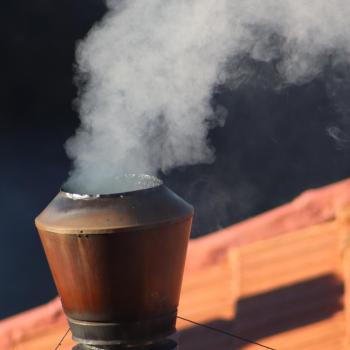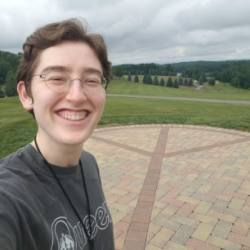 Recently, I was invited to participate in an interfaith event entitled Angels in Religion. This WISDOM community-wide meeting featured artist Lisa Berman, who talked about her sculpture of an angel that was placed in a Catholic cemetery, and what she, a Jewish woman, had learned about angels in the Torah as she crafted this angel. Lisa's presentation was followed by a panel discussion of angels in Hinduism, Christianity, and Islam. The event was open to everyone and was free of cost. As I began to reflect and do research on the topic of angels in the Hindu tradition, I began to wonder if I had done the right thing. What could I say that was relevant, and what common ground could I find for angels and Hinduism?
Recently, I was invited to participate in an interfaith event entitled Angels in Religion. This WISDOM community-wide meeting featured artist Lisa Berman, who talked about her sculpture of an angel that was placed in a Catholic cemetery, and what she, a Jewish woman, had learned about angels in the Torah as she crafted this angel. Lisa's presentation was followed by a panel discussion of angels in Hinduism, Christianity, and Islam. The event was open to everyone and was free of cost. As I began to reflect and do research on the topic of angels in the Hindu tradition, I began to wonder if I had done the right thing. What could I say that was relevant, and what common ground could I find for angels and Hinduism?
As the only non-Abrahamic representative on the panel, I wanted to share concepts from the Hindu tradition, with a hope that my sharing would clear up some of the common misconceptions, and possibly find some universality out of the particularities of our beliefs and practices. While accepting the invitation to participate in the panel, I mentioned to Gail Katz, the President of a non-profit women's organization whose board I sit on, that I took the opportunity since interfaith dialogue is so often these days construed to be between the Abrahamic faiths.
For the last five years and more, I have been inserting the word 'Shanti' into the "Salaam, Shalom, Peace" used in the interfaith landscape here in metro-Detroit. Because of the contentious nature of current relationships between these faith communities, I thought that including my bit of Eastern philosophy into our Western understanding of angels would help broaden the focus. It was also an opportunity for me to research my own tradition, starting with the translation of the word "angel" into my mother tongue (Telugu) as well as the language of my scripture (Sanskrit). And listening and learning of others' faith always deepens my own. After all, as Mahatma Gandhi said in Young India (19 January 1928) ". . . our innermost prayer should be . . . a Hindu should be a better Hindu, a Muslim a better Muslim, a Christian a better Christian."
I started my research with dictionary definitions of the word "angel": one of a class of spiritual beings; a celestial attendant of God. In medieval angelology, angels constituted the lowest of the nine celestial orders. So I knew I had to go further; 'medieval' brings up a primarily Christian image. A second definition—a conventional representation of such a being, in human form, with wings, usually in white robes—reminded me of how I have been trained to imagine angels. Despite growing up in the Northeastern U.S., though, I always thought the apsara Menaka in the picture books I read looked like an angel—Menaka, a celestial nymph, descended from the heavens to leave her infant Shakuntala in the ashram of a sage.
Yet another definition of angel—a messenger, esp. of God—was one that my Hindu WISDOM "sisters" suggested, i.e., that of the divine messenger, Sage Narada. (The "sister" is something we call our Friends and Board members of WISDOM.) And this last definition—an attendant or guardian spirit—led me in the final minutes of my ten-minute presentation to expand on the concept of Ishta Devata. Deva, devata are both words that mean God, who, for a Hindu, can be without form, of many forms, or an infinite form. And so, the God with form can be worshipped and prayed to in the form of a cherished deity, the Ishta Devata. Hindus havemurtis —representations of the devas and devatas—in temples and in shrines or altars in their homes. In bhakti marga, the path of devotion, a Hindu chooses an Ishta Devata for contemplation and worship, supplicating the devata for deliverance (from ignorance) and protection, sort of like hoping that an angel is watching over you.
I spoke to a fully engaged audience of almost sixty, after Lisa's enlightening and touching presentation on how she and another artist created a beautiful bronze angel who would watch over those who lay in their final resting places in a Catholic cemetery. Then, I was "the other" as I listened to clear scriptural references and quotes about angels from the Bible and the Quran, from my co-panelists—a Japanese American Christian and a Muslim who emigrated from the Middle East, who narrated the story of Mary and Joseph from the Islamic scripture.
The evening concluded with a short question-and-answer session, and someone asked about the Angel of Death—is he considered good or bad [from our various perspectives]? The highlight of the evening for me was the way my WISDOM sister Dima's eyes lit with recognition when I responded, "The Hindus consider Yama, the God of Death, to be neither good nor bad—only just." Perhaps angels or apsaras were watching over us, bringing us to the place where we can create common ground.
2/3/2011 5:00:00 AM





